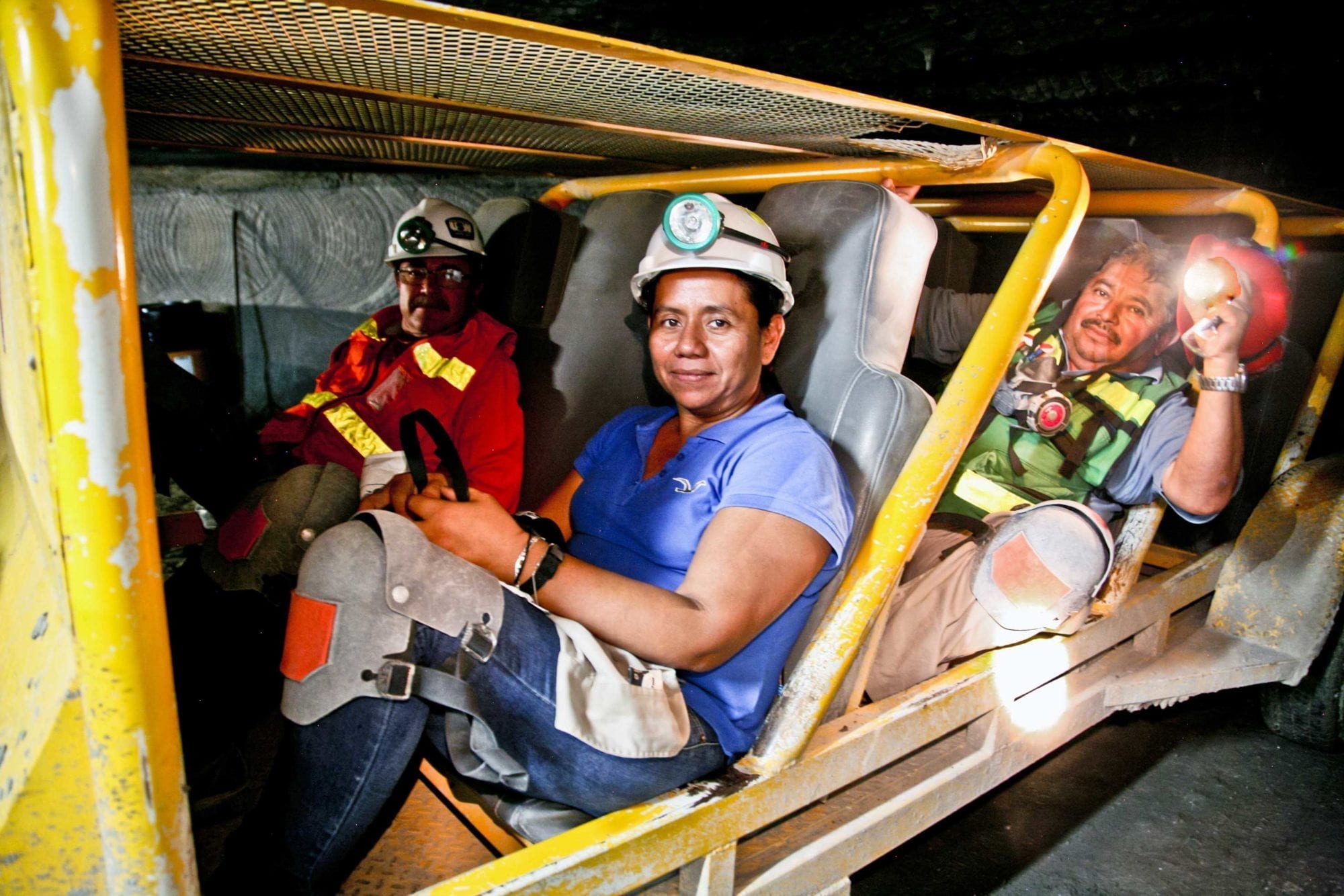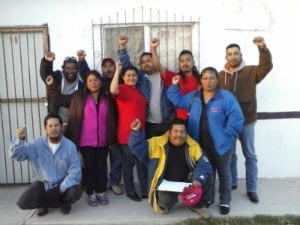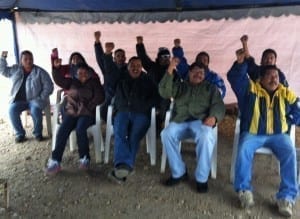
Nov 16, 2023
In response to the unveiling of the Biden administration’s Presidential Memorandum on Advancing Worker Empowerment, Rights and High Labor Standards Globally, Solidarity Center Executive Director Shawna Bader-Blau issued the following statement:
“The Biden administration’s announcement today represents the first time the U.S. government has made a holistic commitment to global worker rights. If this new global labor strategy is fully resourced and implemented, the United States has a historic opportunity to play a critical role in reversing corporate- and government-supported exploitation of millions of working people and bolster democratic freedoms around the world.
“It is impossible to overstate the need for this long-awaited commitment to worker rights. In many countries where the United States has diplomatic, trade and economic development influence, workers’ ability to exercise everyday democracy—through the rights to form and join unions, strike and bargain together for fair wages and decent working conditions—is consistently repressed, often violently and sometimes fatally. In just the past two months, police allegedly shot and killed three garment workers and injured many more during protests for a higher minimum wage in Bangladesh; entered a labor union leader’s home in the Philippines, shooting him dead; and assaulted workers in Nigeria protesting over lost wages, seriously injuring the union’s leader. This new strategy to advance global labor rights is a roadmap for the U.S. government to expand its use of diplomatic and trade leverage and multilateral tools and settings to garner additional countries’ support for upholding worker rights.
“The U.S. government should use its direct influence or its convening power with other nations to address labor rights repression in places like Belarus and Myanmar, where unions fighting for democracy have been outlawed by their governments, their leaders and members beaten, jailed, sent into exile or killed.
“This all-of-government labor rights strategy should also focus on influencing labor laws and increasing employer accountability. Today, U.S. companies too often treat sourcing like a game of Whac-A-Mole, jumping from country to country when strengthened and enforced labor laws drive workers’ pay closer to a living wage. And, most of the 2 billion people who work in the informal economy, including agriculture and domestic workers, street vendors and drivers and delivery workers in the growing platform economy, have no access to health care, sick leave or support when they are injured or lose their jobs.
“The Biden administration’s trade approach in Mexico has the potential to be a game-changer for workers and an example of this new labor strategy’s potential impact. The U.S.-Mexico-Canada Agreement includes a rapid response complaint mechanism unions are using to remedy worker rights abuses. Tying worker rights to U.S. market access and investing in independent union organizing has led to an unprecedented growth of democratic unions that represent workers’ interests and are winning wage hikes and safety improvements in factories that supply the U.S. market. Replicating this kind of approach to worker-centered trade policy should be a priority.
“We are hopeful that this commitment to global labor rights will mean workers are represented in conversations about how to sustain good union jobs in communities worldwide that are most impacted by the transition to a clean energy economy. We look forward to workers’ rights and livelihoods becoming front-and-center in conversations about the evolution of technology in the workplace. And, we look forward to expanded investment and prioritization of a worker rights approach to ending gender-based violence and harassment and other forms of exploitation on the job.”

Jun 19, 2015
Héctor Martínez Motiño, president of a local sectional union of Workers of the National Autonomous University of Honduras (SITRAUNAH), was murdered Tuesday, shot by gunmen as he drove home from work.
Martínez Motiño, a lecturer at the Choluteca campus of the National Autonomous University of Honduras, in the south of the country, had faced three other attempts on his life and numerous anonymous threats, the result of his reporting of violations of human and worker rights within the university.
He took his complaints of harassment to the Inter-American Commission on Human Rights, which issued a “precautionary measure” demanding that the Honduran government provide protection for him and his family as his union work put him in danger. The Commission “may request that a State adopt precautionary measures to prevent irreparable harm to persons or to the subject matter of the proceedings in connection with a pending petition or case, as well as to persons under the jurisdiction of the State concerned, independently of any pending petition or case.”
Despite these measures, Martínez Motiño reported feeling unsafe. On Facebook, he posted: “Despite these measures, I continue to be harassed, followed, threatened and the target of attempts against my life. I ask God and all of you to keep us in permanent prayer.”
According to news reports, he had no police protection at the time of the attack. With this murder, 14 people with protective measures have been assassinated, according to the website Defensores en Línea. On April 8, Donatilo Jiménez, president of another local sectional union of university workers SITRAUNAH from the Atlantic Coast, was kidnapped and disappeared; to date, only his vehicle has been found. An MS-13 gang leader has been arrested in connection with this crime.
Martínez Motiño was a member of the Honduran Network Against Anti-Union Violence, an effort of labor union activists and the human rights non-governmental organization ACI-Participa, supported by the Solidarity Center. The network, Honduran labor movement and ACI-Participa condemn the “vile murder” and are demanding a full investigation.
Jun 20, 2013

Ten workers fired for union activity have refused severance pay. Credit: CFO
An international auto parts production plants has violated worker rights numerous times with actions that include a retaliatory mass firing and interference with union elections, according to a new report by the Worker Rights Consortium (WRC).
Since August 2011, the actions of Arneses y Accesorios de Mexico have “represented serious and clear-cut violations of international labor standards as embodied in the conventions of the International Labor Organization, as well as the codes of conduct of several of PKC’s customer firms,” according to the report.
In December, the Finnish-owned PKC fired more than 100 union supporters at Arneses y Accesorios, including the entire union committee, for campaigning for the election of an independent trade union, the National Union of Mine and Metalworkers (known as “Los Mineros”), a Solidarity Center partner, at their plants in Ciudad Acuña, Mexico. According to Los Mineros, the “workers were called individually to the human resources office and told to sign a ‘voluntary’ resignation letter. Officials of the Federal Labor Board were present and encouraged the workers to sign.” The union says workers were told that “the company has decided it no longer needs your services.”
The report found that the company denied workers the opportunity to exercise their right to freely join a union and bargain collectively by:
• Installing a so-called protection contract with the Confederación de Trabajadores de México (Confederation of Workers of Mexico, CTM), and subsequently using the agreement to prevent workers from freely exercising their associational rights. The CTM is a labor organization with a history of acting as “protection union” by assisting employers in blocking independent unionization efforts.
• Engaging in anti-union harassment and intimidation in the lead-up to a union election in October 2012. Such actions included directing managers to issue anti-union threats and hold captive audience meetings to dissuade workers from joining Los Mineros.
• Manipulating the union election by hiring short-term employees and directing them to vote for CTM.
The report also documented sexual harassment of women workers, who “provided credible testimony that Arneses y Accesorios managers pressured them to engage in sexual relations in exchange for promotions or other work benefits.”
The 20-page report lists recommendation for restoring worker rights at Arneses y Accesorios, which include immediately reinstating all workers dismissed in retaliation for exercising their right to freely associate and providing them with back pay.
Read the full report.
Jan 9, 2013

Workers in Mexico launched a hunger strike for justice at PKC autoparts plants. Credit: Javier Zuniga/Los Mineros
Eleven workers from PKC wire harness plants in Mexico launched a hunger strike yesterday. They were among 122 workers fired by the Finnish autoparts company in mid-December for what they say is retaliation for seeking to form a union. They plan to continue the hunger strike until they are reinstated and their right to trade union freedom is recognized.
The fired workers include 18 members of the executive committee of Local 307 of the National Mineworkers Union (Los Mineros). The union believes the action was in retaliation for their pro-union vote at a rigged representation election in October.
According to Los Mineros, “workers were called individually to the human resources office and told to sign a ‘voluntary’ resignation letter. Officials of the Federal Labor Board were present and encouraged the workers to sign.” The union says workers were told that “the company has decided it no longer needs your services.” Further, the dismissals were distributed across PKC’s five plants and not concentrated in a particular production line, a fact Los Mineros says shows the dismissals cannot be linked to the loss of a client order, which is often given as a reason for mass dismissals.
Ten workers at the plants, located in Ciudad Acuña, did not sign the resignation letters and with the union’s support, have filed legal demands for reinstatement with the Federal Labor Board.
The Border Workers Committee (Comité Fronterizo de Obreras, CFO) and Los Mineros, long-term partners in educating and assisting workers who wish to form independent unions, are working together on the organizing campaign, which has gained global support
Shortly after the company rejected Los Mineros’s request for collective bargaining in 2011, PKC announced that it had signed a contract with a corporate-backed “union,” CTM, to “protect” the company from other union interests. After successful appeals by Los Mineros, the Mexican government authorized the union election, and in October 2012, the union won 2,311 votes.
All Los Mineros’s election observers were among those fired in December. International support—which includes IndustriALL, the metal workers unions in Finland and Sweden, the United Steelworkers (USW), the United Auto Workers (UAW) and the AFL-CIO—has exposed PKC’s efforts to impose a protection union and rig the election and a major Finnish television network ran an exposé on the company’s operations shortly before the corporation’s annual shareholder meeting.




